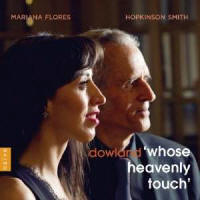Texte paru dans: / Appeared in: Naïve |
|
|
Reviewer: David
Reznick
I’m always glad to see a new release of songs by John Dowland, because it helps to fulfill one of my long-standing hopes: to establish Dowland as one of the greatest composers in history, worthy of a permanent seat in the Temple of Demigods (Music Division). Like many other 16th- and 17th-century composers, Dowland was roused from his eternal sleep due to the LP record. Since then, there has been a flood of Dowland on records. One of the first Dowland performers, Alfred Deller, was one of the best; his recordings are still available, and it’s amazing how they hold up. The pop singer Sting released an album of Dowland. Today there are many Dowland recordings on sale.
There probably won’t be a
Bach-Beethoven-Brahms-Dowland era coming anytime soon, unless people
suddenly get tired of guitars and take up lutes (recommended). But I have no
doubt of his claim to immortality: melody. Dowland found a formula; his
melodies have persisted through centuries. More than that, they have
retained the same meanings and still impart the same emotional power “to
charm the sense and captivate the mind.” They still work when sung in the
moonlight under your girlfriend’s window. They’re still sexy after all these
years. The booklet which accompanies this disc gets you in the mood: It contains a rhapsodic paean to the lute by Hopkinson Smith, who expresses his love for the instrument to the point that you can almost hear Pee Wee Hermann saying, “Then why don’t you marry it?” He is sometimes discussing technical issues and sometimes writing pure poetry. As the Ancient Mariner said to the Wedding Guest, “You ain’t heard nothin’ yet! Blah, blah blah!” (NOTE: Quoted from memory; may not be exact.) At one point he says that the vocal line and the accompaniment may not be equal; the two elements in this performance share the identical dynamics throughout. This highlights the only problem I have with the CD: It sounds to me as if sometimes the lute overpowers the voice. The vocalist Mariana Flores, whose timbre is ideal for this music, was born and raised in Argentina, and I’m not sure that first-time listeners to these songs will be able to understand all of her English. Otherwise, this is an excellent recital which, time and again, will touch your heart.
| |
|
|
|
|
|
|
|
Cliquez l'un ou l'autre
bouton pour découvrir bien d'autres critiques de CD |
|




